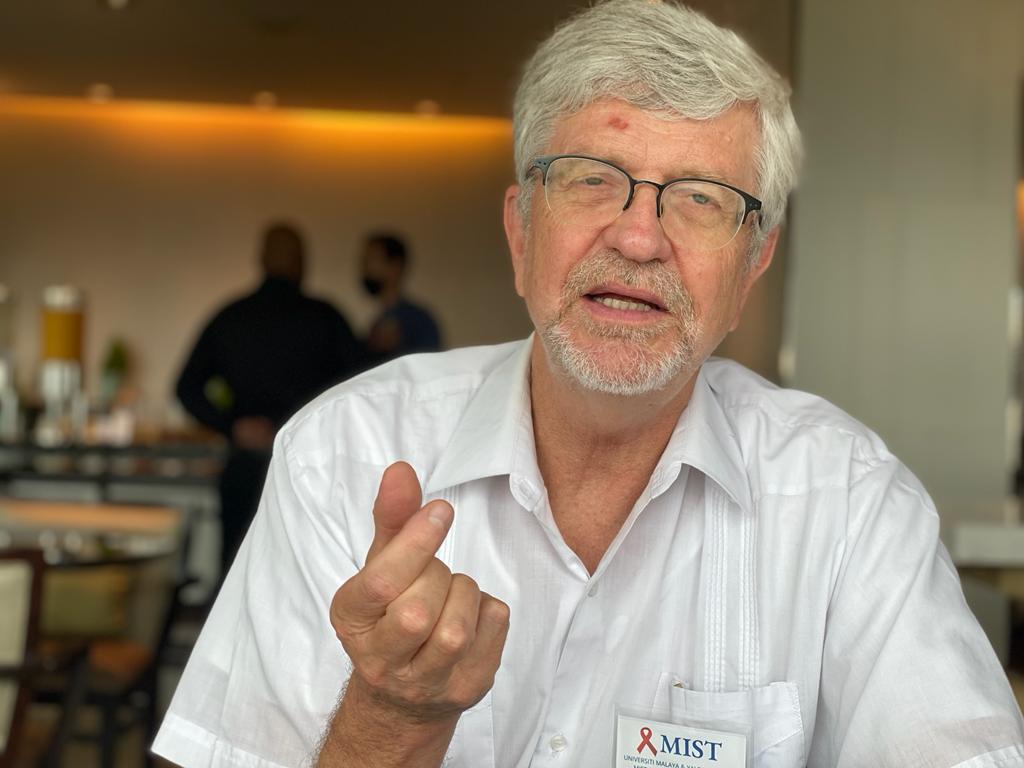KUALA LUMPUR, August 4 – A public health expert from Yale University has criticised public health communications about Covid-19 from the World Health Organization (WHO) and the United States’ Centers for Disease Control and Prevention (CDC).
Prof Dr Sten H. Vermund, who is a dean at the Yale School of Public Health in the United States, said both health agencies – which initially said in early 2020 that Covid-19 was primarily spread through droplets, before acknowledging that the airborne virus was transmitted by aerosols – shouldn’t have been too “pedantic” about the transmission method of the respiratory disease.
“People didn’t know that there’s a difference between a droplet and an aerosol. It sounded like they were saying this isn’t respiratory spread, which is ridiculous,” Dr Vermund told CodeBlue in a recent interview here.
“So I think that two of the premier public health agencies on the planet Earth, which is the US CDC and WHO, could have done better in popular communications.”
The infectious disease epidemiologist said he found the debate on whether Covid-19 was transmitted through droplets or aerosols to be “quite absurd”, as it had nothing to do with control of the pandemic.
“I think people were saying if it was aerosol, therefore masks won’t work. That turned out to be wrong, so why not recommend masks and work out the science over time?
“You should have a best guess — we often do best guesses in public health. We don’t know the absolute right answer, but we make our best guess based on the weight of the science.”
Dr Vermund pointed out that a paper that he and his colleagues published in March 2020 had recommended that the public wear double-ply cloth masks, due to a shortage of N95, KN95, and surgical masks for frontline health care workers.
However, he was unable to get support even from Yale University because its medical school had argued then that there was insufficient evidence on the effectiveness of cloth masks against Covid-19.
“We had published papers from other respiratory viruses that suggested cloth masks were better than no mask. So we said why not err on the side of caution and do aggressive expansion of mask use.”
The American public health expert stressed the need for public health agencies to produce simpler messaging based on “best guesses” that do not have to be 100 per cent evidence-based.
When asked if it was fine for public health bodies to admit that they do not have the evidence yet in future pandemics with novel pathogens, Dr Vermund agreed, saying: “Yeah, don’t lie to people.”
For Covid-19, he said public health agencies could have simply cited previous experience with respiratory pathogens on the need for masking even though evidence specific to Covid-19 was not yet available early during the pandemic.
Similarly, filtration in buildings should have been improved early during the Covid-19 pandemic to reduce the risk of infection.
“We had other issues where [people were saying], were there randomised control trials saying excellent indoor air filtration would reduce Covid? Of course we wouldn’t have randomised control trials because Covid just emerged,” Dr Vermund pointed out.
“But we know from decades and decades of work that you can reduce the risk of indoor pathogens – they can be allergens, pollens, things like that, dust, and infectious agents – by having a better quality filtration system.
“So the notion of upgrading filtration systems in indoor settings was a reasonable thing to recommend, even if we didn’t have definitive data.”
Legal Mandates Must Be Accompanied With Health Communications
Dr Vermund compared legal mandates during the Covid-19 pandemic, such as vaccine passes, to laws against speeding to protect public safety.
“So if you extend that to pandemic response, it’s not such a great leap, but that’s probably how the Malaysian Ministry of Health (MOH) sees it; it’s just an extension of safety considerations.”
The Malaysian government used Covid vaccine passes to deny unvaccinated people access to public premises, including government services, besides issuing RM10,000 fines for breaches of Covid-19 rules, like failure to wear face masks in public areas, during the state of emergency last year.
Malaysia has among the highest Covid vaccination rates in the world, with nearly 84 per cent of its total population inoculated with two doses.
“I think legal mandates have to be accompanied by broad public health education, like radio programmes,” Dr Vermund said.
“The person who does something because they have to do it may not have a sustained motive compared to a person who does it because they want to do it.”








